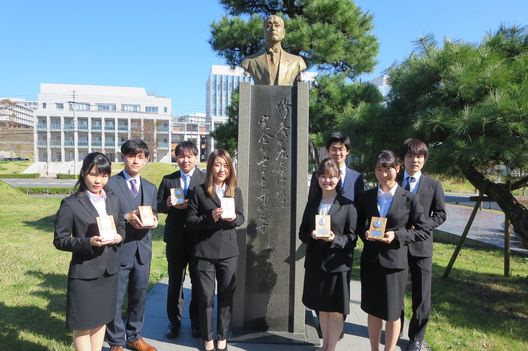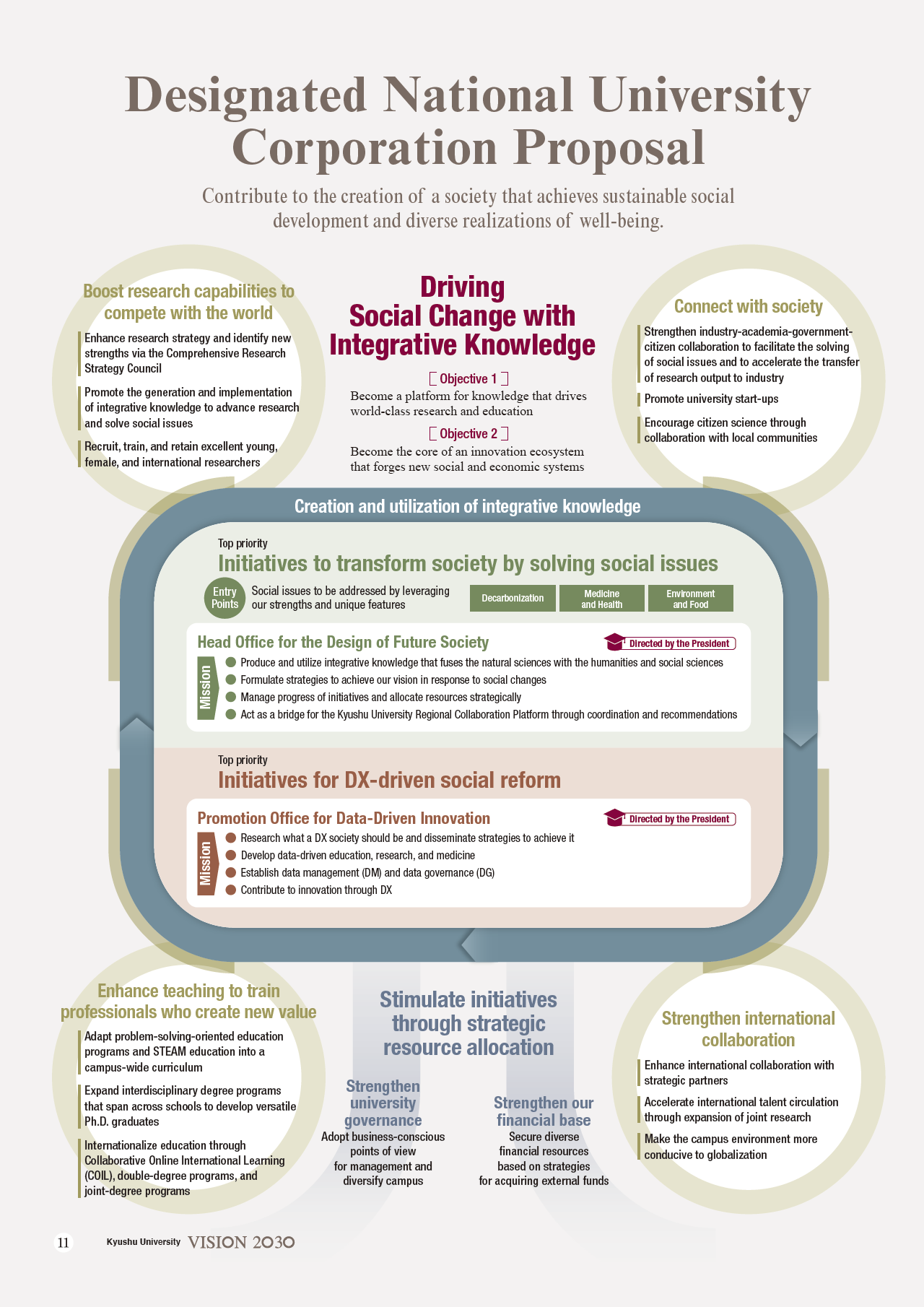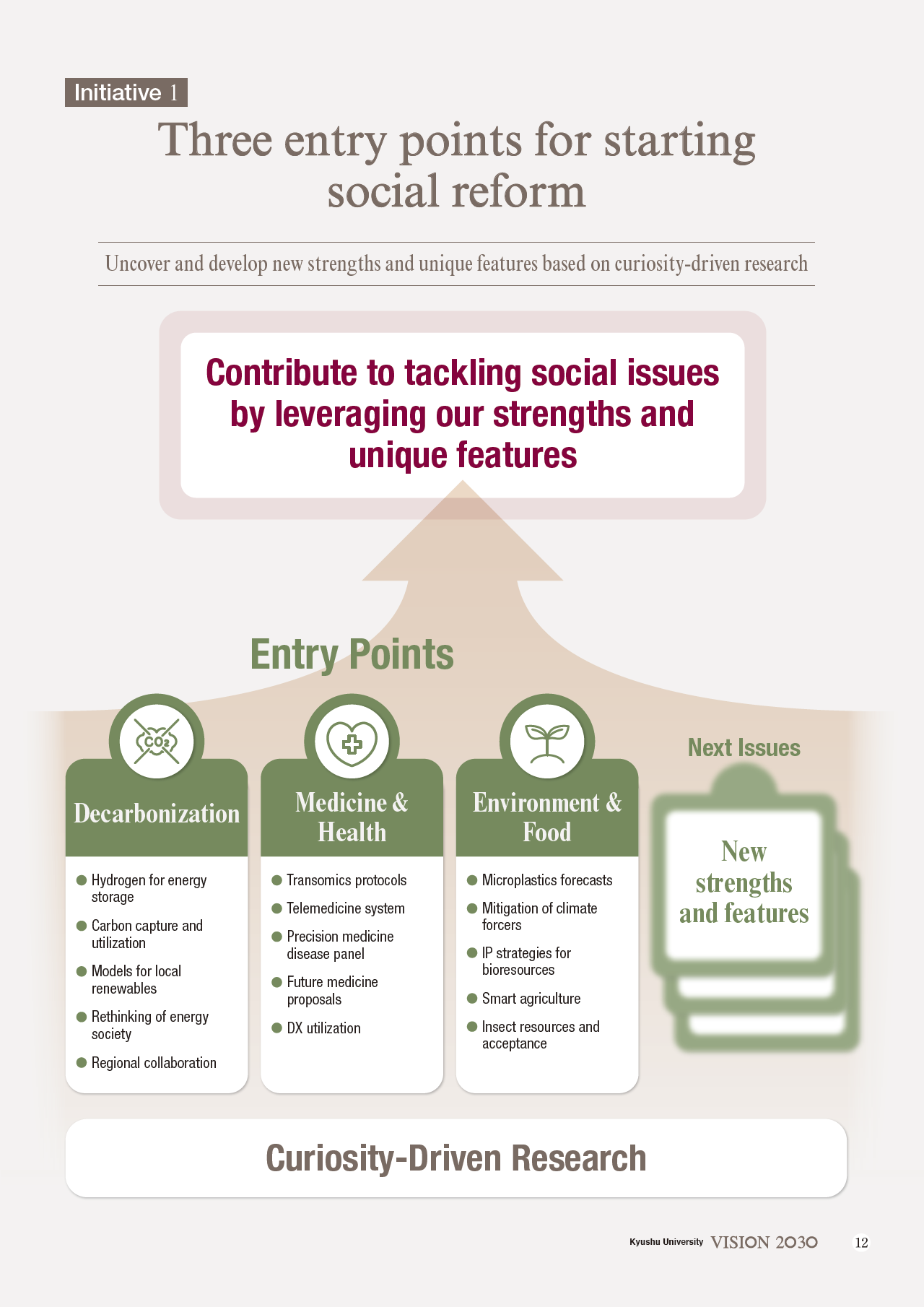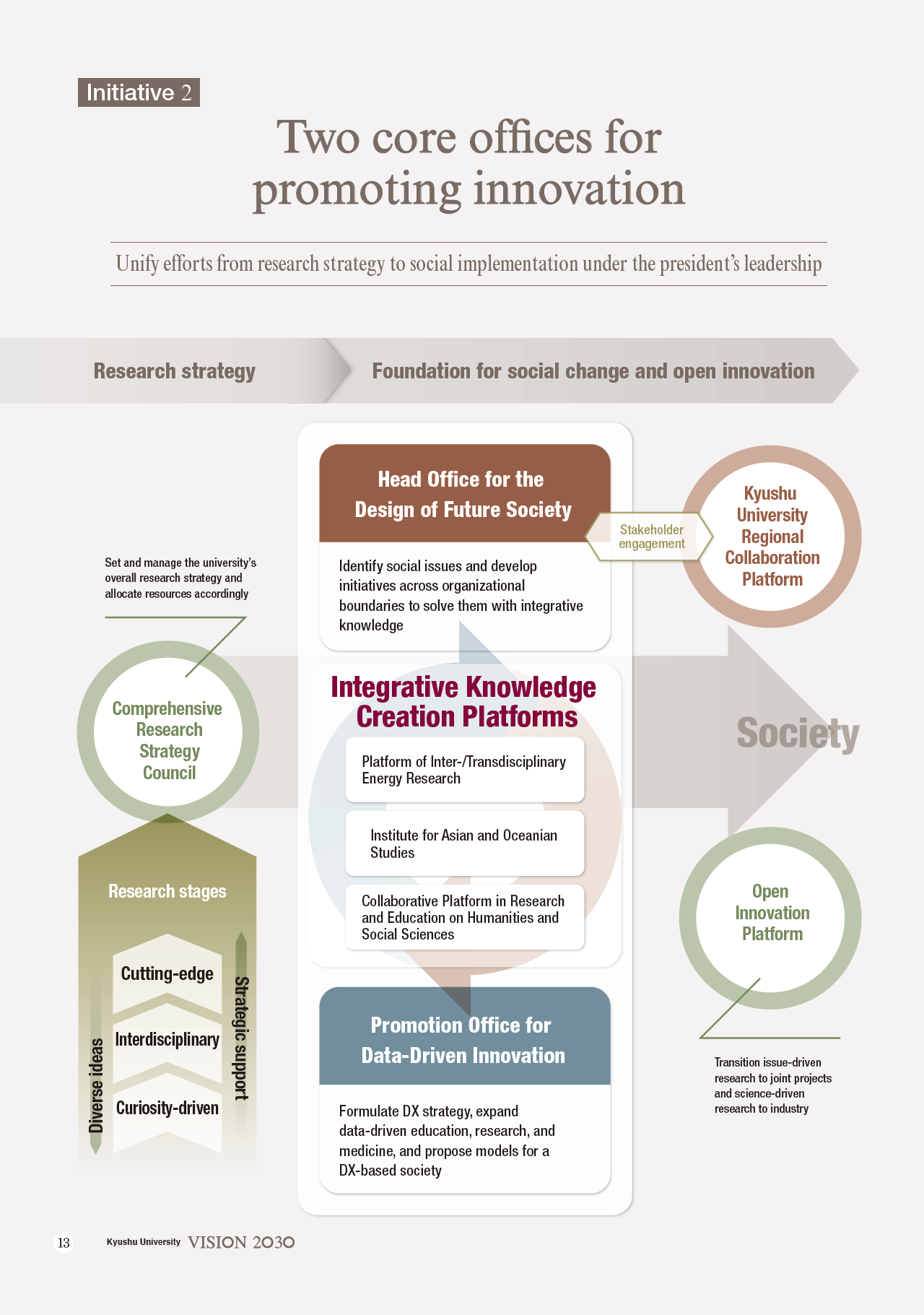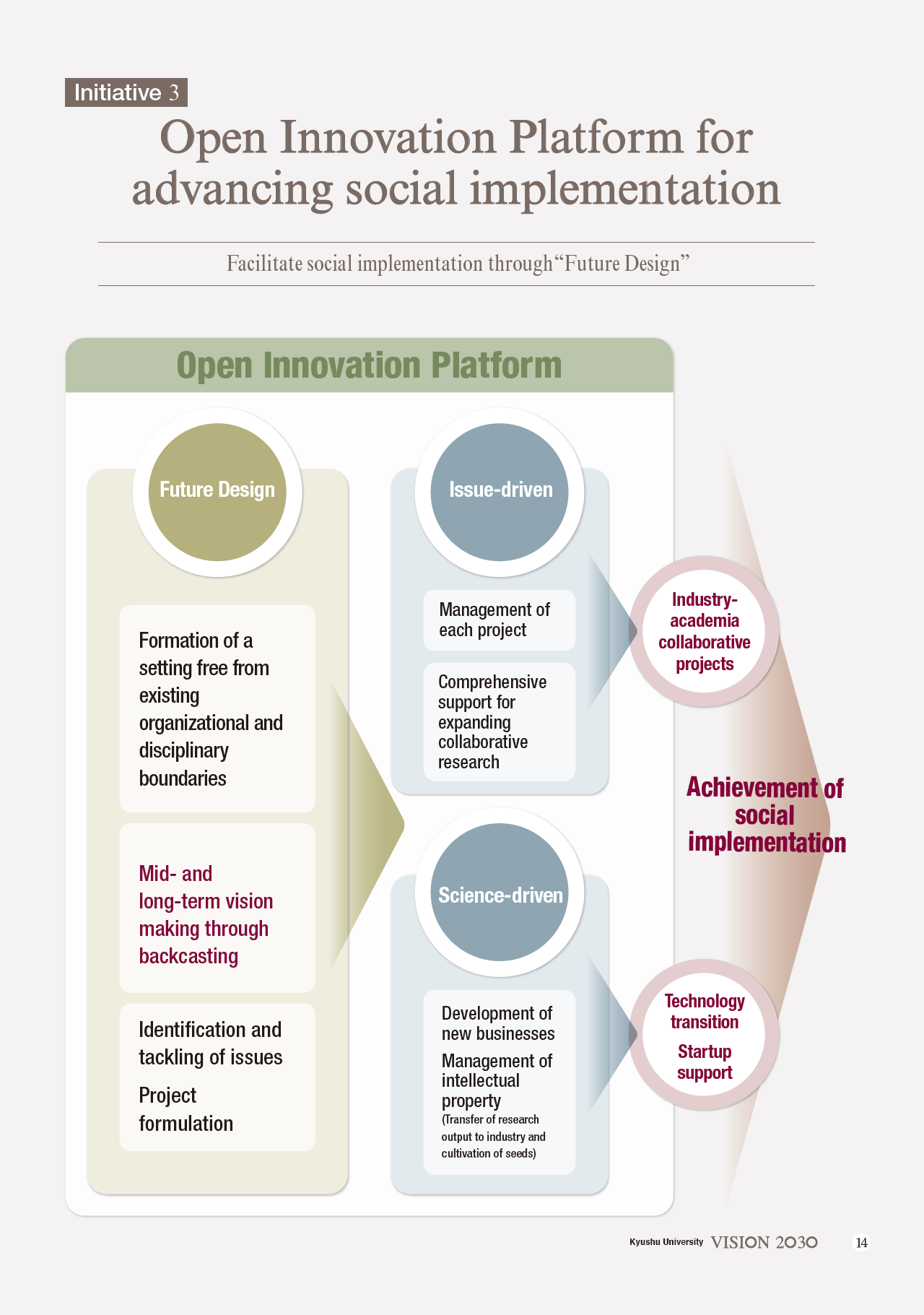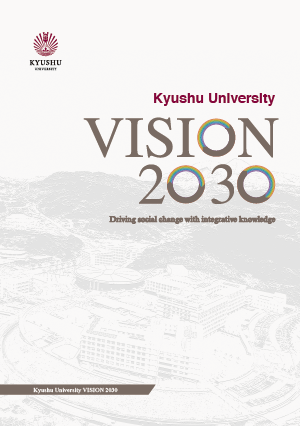- TOP
- About
- Office of the President
- Kyushu University Vision 2030
- TOP
- About
- Office of the President
- Kyushu University Vision 2030

Driving social change with integrative knowledge
Driving social change with integrative knowledge
Message from the President
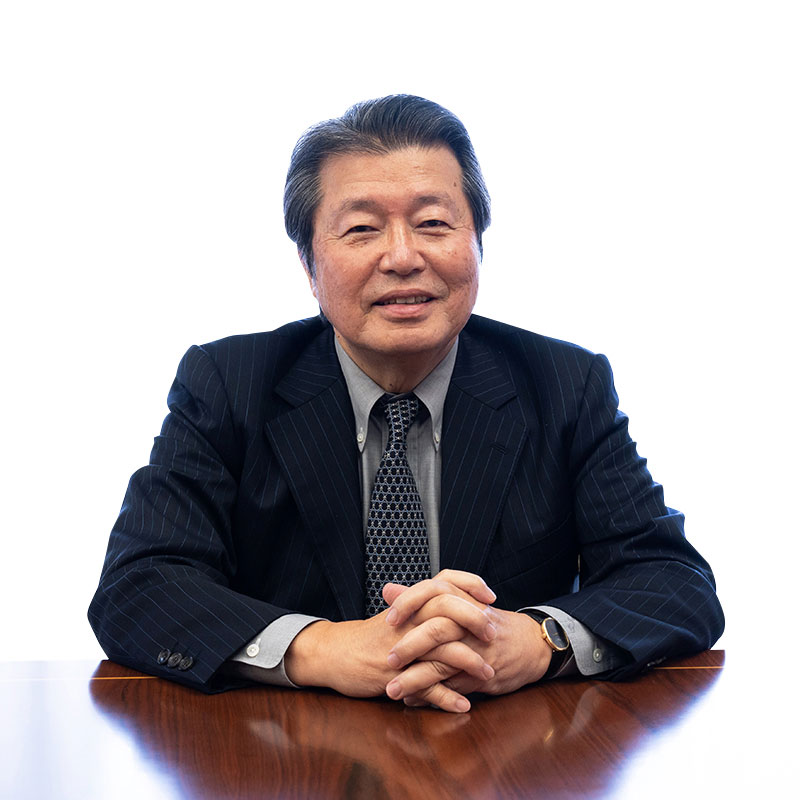
Kyushu University Vision 2030 outlines our path to transform Kyushu University into a “university that drives social change with integrative knowledge.” Developed in parallel with our application to become a Designated National University Corporation, this ten-year vision was crafted based on numerous discussions across the university, including many with the young faculty members who will lead us into the future.
Universities are selected as Designated National University Corporations by Japan’s Ministry of Education, Culture, Sports, Science and Technology (MEXT) with the expectation that they will boost their research and education capabilities to compete at the highest level in the world, and Kyushu University received this designation in November 2021.
Since its onset, the COVID-19 pandemic has greatly impacted our lives and restricted our everyday activities, and its tremendous economic and social costs have yet to be fully grasped. Kyushu University must contribute to the restructuring of society to be more sustainable in this new era with and beyond COVID-19. We will draw upon our substantial research achievements and knowledge accumulated over our history to play a leading role in providing solutions to difficult problems posed by this rapidly changing landscape, rise to the next level, and become a true driving force toward the development of a sustainable society that prioritizes people’s well-being.
Kyushu University’s vision of itself in 2030 is one of a university that attracts excellent researchers, accelerates research and innovation that lead to new value creation, and uses integrative knowledge that fuses the entire spectrum of knowledge—from the natural sciences to the humanities and social sciences and even design—to solve social problems and forge new social and economic systems. In short, a university that drives social change with integrative knowledge.
To accomplish this, Kyushu University must become a hub for global talent circulation and establish itself as a world-class knowledge platform that attracts superb talent and citizens' interests and creates new value through integrative knowledge. We will build this platform on curiosity-driven basic research, the cutting-edge research that these endeavors in turn spur, and education that cultivates inquisitive minds in students so that they can create the future.
Furthermore, we will make Kyushu University into the core of an innovation ecosystem capable of self-sustained growth by extending this wave of integrative-knowledge-driven reform in social and economic systems from Fukuoka outward to Asia and the world, reinvesting these achievements to further expand and develop the university’s research and education resources.
In conclusion, we are committed to Kyushu University Vision 2030 to further build upon the knowledge accumulated through our history and transform into an institute of higher education that offers and advances world-class research and education that appeal to students and researchers everywhere.
Tatsuro Ishibashi
President, Kyushu University
November 2021
President, Kyushu University
November 2021
Vision 2030 Process
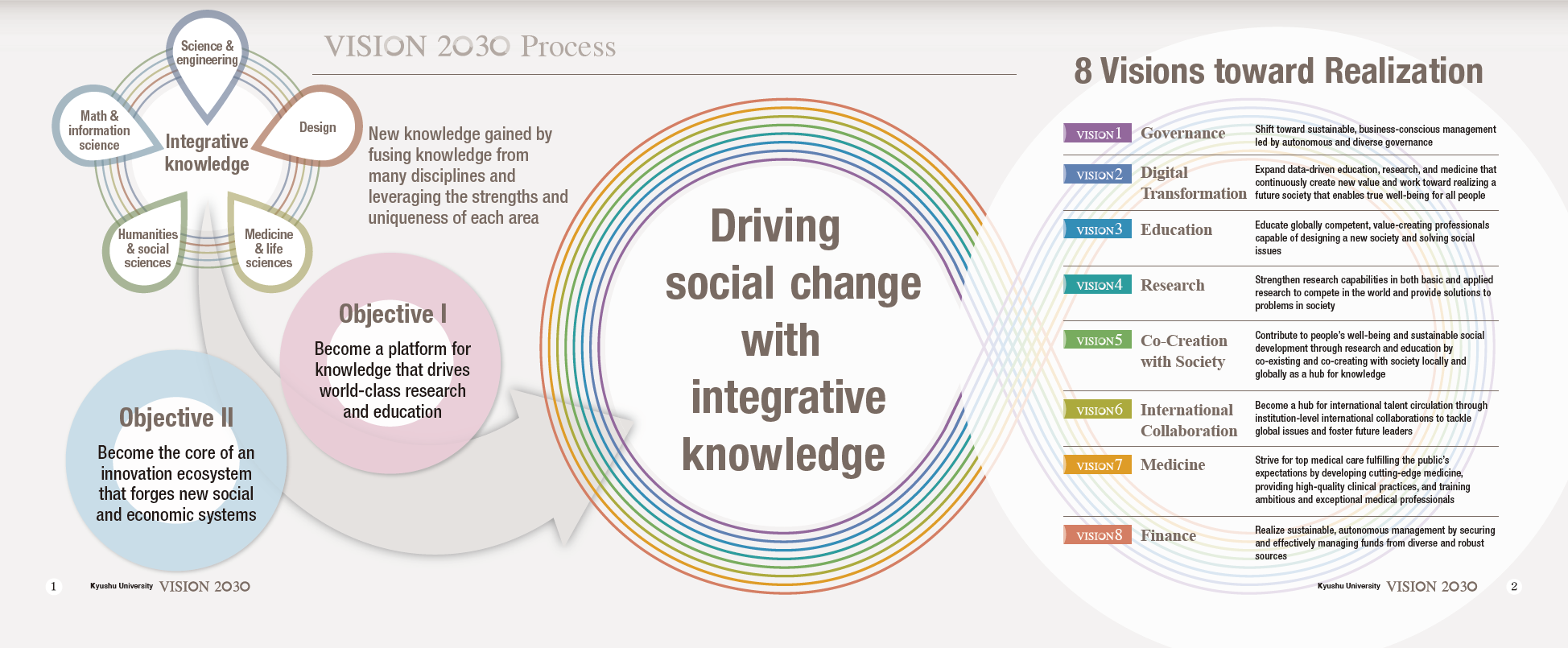
8 Visions toward Realization
Governance
Shift toward sustainable, business-conscious management led by autonomous and diverse governance
Enhance evidence-based, strategic decision-making
Gather and analyze data pertaining to various research, education, and outreach activities at the university and use this evidence for guiding university management decisions, planning, evaluation, and resource allocation to achieve self-sustainability.
Strengthen stakeholder engagement
Expand opportunities for diverse stakeholders to provide new perspectives and advice for use improving university management and strengthen industry-academia-government-citizen collaboration to contribute further to development of the local region.
Promote diversity, equity, and inclusion
Build an environment that encourages the recruitment of talented people from diverse backgrounds and lifestyles, regardless of nationality, gender, race, and age, in all positions throughout the university and introduce corporate, international, and equity points of view into university management.
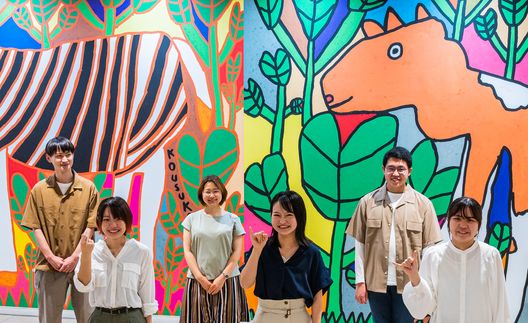
Digital
Transformation
Expand data-driven education, research, and medicine that continuously create new value and work toward realizing a future society that enables true well-being for all people
Develop and promote new models for society
Fuse knowledge from multiple disciplines to devise new models for realizing a people-centered society utilizing digital transformation (DX) and disseminate and share the outcomes of this research with society.
Train data-literate professionals
Establish a research and learning environment that is flush with opportunities to acquire math, data science, and AI skills such as by utilizing open data and train students and researchers to be able to incorporate these skills in their own research fields.
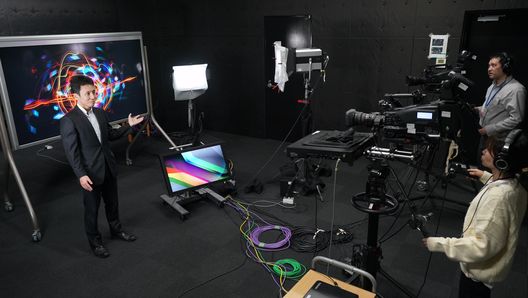
Promote DX-led projects with high potential for social impact and implementation
Create new value that enables social and economic system reform through data-driven education, research, and medicine and share and utilize the output of these efforts in various regions through collaboration with local governments and the private sector.

Education
Educate globally competent, value-creating professionals capable of designing a new society and solving social issues
Incorporate problem-solving and value-creation education in all curricula
Introduce perspectives and thinking for identifying and solving problems and creating value into all undergraduate and graduate curricula and train professionals who can design a new society and create new value with integrative knowledge.
Introduce integrative, cross-disciplinary doctoral degree programs
Train highly skilled knowledge professionals with multifaceted skills and perspectives by introducing integrative, cross-disciplinary doctoral degree programs
Strengthen industry connections and entrepreneurship training
Boost collaboration on education with the private sector to further diversify career path options upon graduation and introduce system-wide entrepreneurship education to train human resources who will take the challenge to create new value.
Enhance student support for diverse needs
Enrich the campus and research environment to accommodate the diverse needs of all students to help them succeed and enhance not only financial support, such as with fellowships, but also comprehensive student support.

Research
Strengthen research capabilities in both basic and applied research to compete in the world and provide solutions to problems in society
Boost research strategizing and support toward creating integrative knowledge
Bolster the university’s functions for strategizing and coordinating research efforts and focus research support through effective resource allocation to reinforce our platform for creating integrative knowledge that advances technology and solves social issues.
Strengthen cutting-edge research and discovery of new fields
Strategically allocate funds and personnel to accelerate our leading research in key areas for society such as decarbonization, medicine and health, and environment and food and unlock and grow new research areas to continue contributing to society.

Recruit excellent early-career researchers and enrich the research environment
Introduce a comprehensive support system to recruit, train, and retain excellent early-career, female, and international researchers and make the research environment even more conducive to exploring new ideas through systems such as for a Free Quarter for Research (FQR)* and research equipment sharing.
*The Free Quarter for Research (FQR) system aims to reduce the burden of teaching and administrative tasks and allow researchers to secure at least one quarter dedicated solely to research by taking advantage of the quarter system for educational courses; streamlining and integrating class subjects through the use of digital technology; setting a three-month period during which administrative meetings of the university as well as departments will, in principle, not be held; and reducing the number of participants in and the frequency of such meetings.

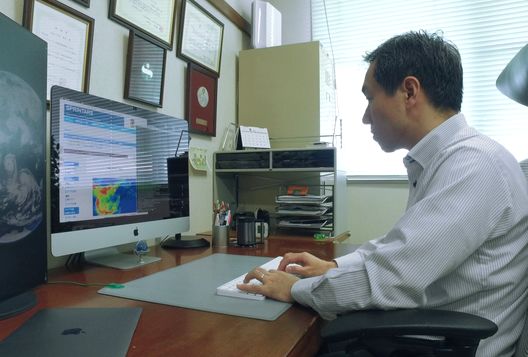
Co-Creation
with Society
Contribute to people’s well-being and sustainable social development through research and education by co-existing and co-creating with society locally and globally as a hub for knowledge
Identify issues and make visions by collaborating across sectors
Encourage collaborative projects with industry, academia, government, and citizens by forming a platform for collaborations that cross organizational boundaries and identifying and creating mid- to long-term goals and visions through backcasting.
Implement research output in society
Quickly capture outstanding research findings that can generate innovation and bring these new technologies to society starting in Fukuoka and Kyushu and extending out to Asia and the world by growing collaborations with society and boosting the creation of intellectual property and startups.
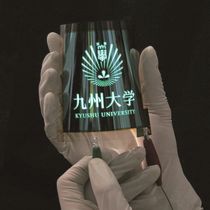
Promote community outreach and citizen science
Expand community outreach activities to promote research and innovation that are socially responsible and involve the local community in research and educational activities related to social experiments.
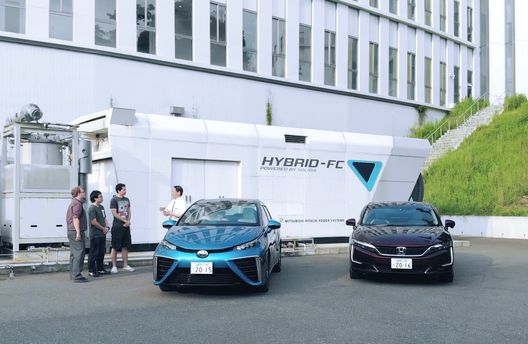
International
Collaboration
Become a hub for international talent circulation through institution-level international collaborations to tackle global issues and foster future leaders
Expand and deepen strategic international partnerships
Lead international consortia of higher education institutions to showcase Kyushu University’s strengths and unique features and select and refocus existing and new strategic partnerships to expand and deepen international collaboration.
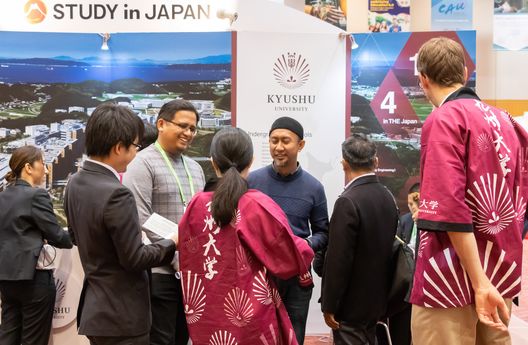
Establish a robust collaboration network for early-career researchers
Become a hub for international talent circulation that attracts early-career researchers from home and abroad across disciplines and generations and build a robust research and education network.
Build a global environment
Improve financial support and the living and work environment for international students and researchers through collaboration with the private sector and encourage exchange and collaboration among Japanese and international students and researchers.
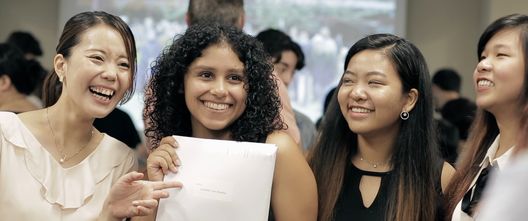
Medicine
Strive for top medical care fulfilling the public’s expectations by developing cutting-edge medicine, providing high-quality clinical practices, and training ambitious and exceptional medical professionals
Provide treatment and train specialists for infectious diseases
Provide clinical care for emerging and re-emerging infectious diseases such as COVID-19 and train medical specialists for supporting these efforts to contribute to ensuring safety and protection of local communities against infectious diseases.
Become a hub for genomic cancer medicine and for clinical research
Provide cutting-edge medical care in the local community such as through cancer treatment guided by genome analysis and act as a hub for clinical research that contributes to the development of pharmaceutical products and medical equipment.

Develop personalized healthcare
Develop cutting-edge personalized medicine by collecting clinical data and samples from regional and disease cohorts, analyzing them with newly developing technologies, and revealing the molecular origins of diseases for each individual patient.

Finance
Realize sustainable, autonomous management by securing and effectively managing funds from diverse and robust sources
Increase external funding through institutional agreements
Increase institutional collaboration agreements with the private sector to accelerate research that leads to social impact and application and secure external funding such as through large-scale research collaborations and commissioned research to further advance the university’s research and education resources.
Boost intellectual property income by accelerating startup creation
Develop multi-layered startup support funds and establish a systematic program to foster entrepreneurs to accelerate the creation of university startups and increase income from intellectual properties.
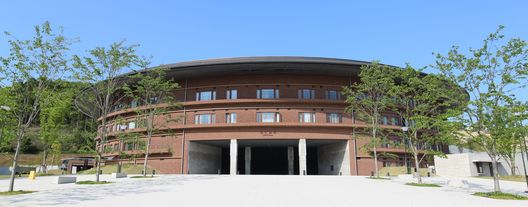
Expand donation income by strengthening ties
Increase income from donations by strengthening ties with a wide range of stakeholders, such as alumni and international students, and by enhancing fundraising functions.
